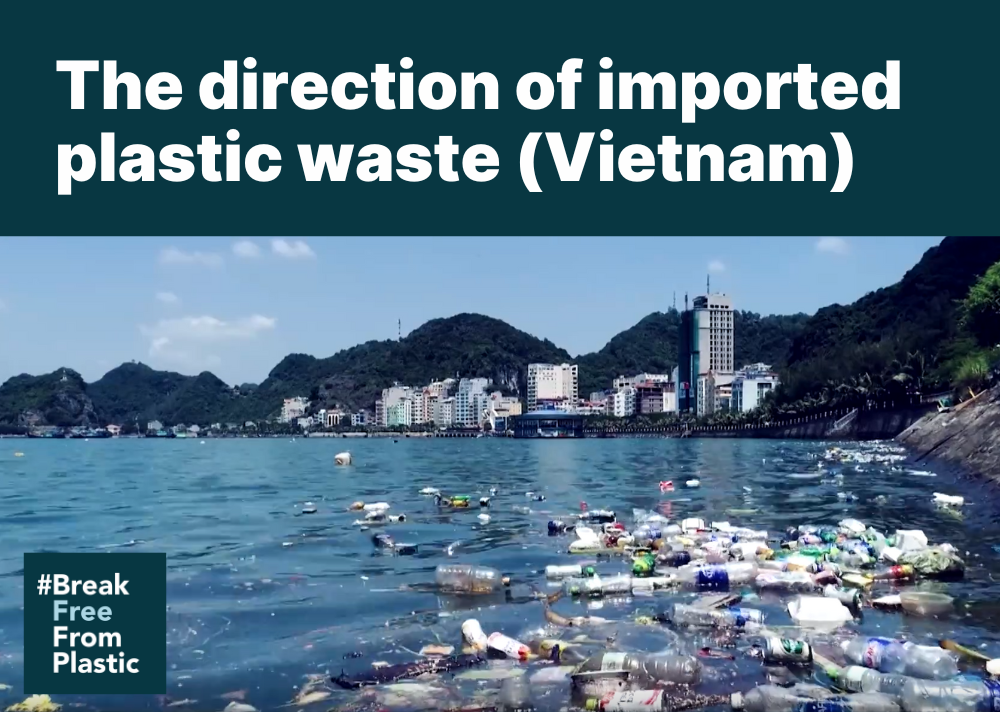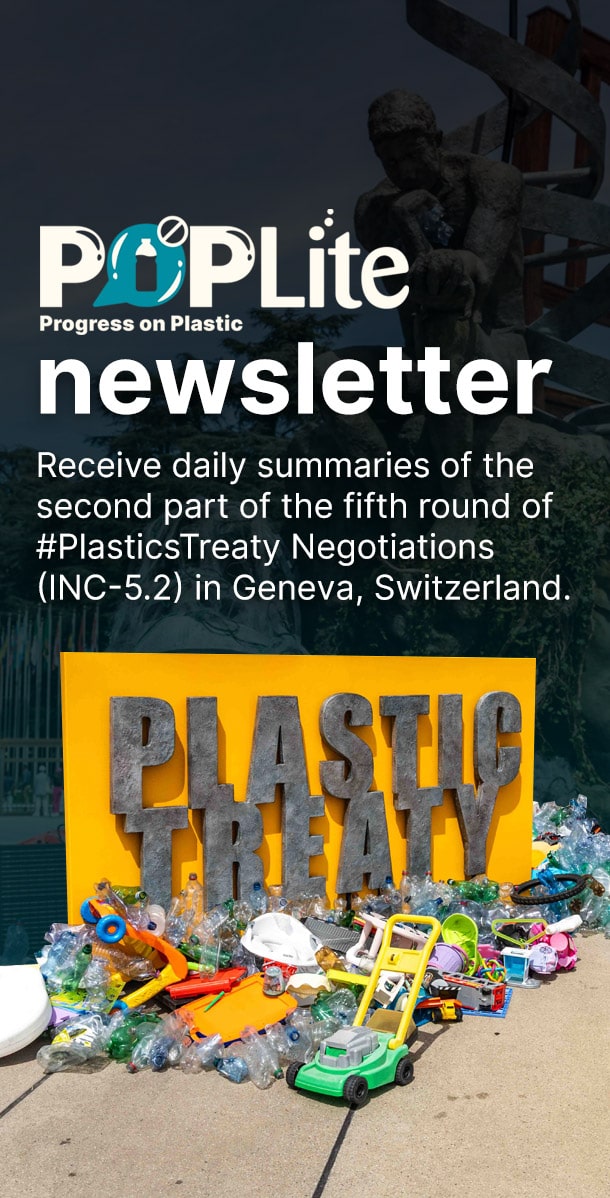This blog encapsulates a conversation with Ms. Xuan Quach, the Country Director of Pacific Environment Vietnam, the organisation that commissioned the thought-provoking documentary, "The Direction for Imported Plastic Waste (in Vietnamese, with English subtitles)."
It delves into the intricate layers of Vietnam's burgeoning plastic production and its consequential reliance on imported plastic waste. Through this exchange, we aim to shed light on the complexities of the plastic waste trade and ignite meaningful discourse on the imperative for change, not just in Vietnam but in other waste-recipient countries in Southeast Asia as well.
Q1. What inspired the creation of "The Direction for Imported Plastic Waste?”
A: Currently, in Vietnam, the issue of imported plastic waste is not receiving much attention. We are one of the first organizations to pay attention to this issue. However, effective communication requires materials, which are currently very scarce (or can be said to be nonexistent). Conversely, there is a significant amount of plastic waste being imported into Vietnam. For example, in 2022, over 2 million tons of plastic waste were imported, a staggering figure. Vietnam ranks second globally, only behind Malaysia.
However, campaigns regarding the import of plastic waste in other countries are very active, such as requiring the return of waste to the exporting country.
We hope to have visual materials to integrate with communication campaigns to share the current situation of imported waste in Vietnam. If the situation of importing plastic waste into Vietnam continues, domestic plastic waste will be disposed of. Therefore, we also aim to use communication about this issue to promote the incorporation of domestic plastic waste into the waste cycle, prioritizing domestic plastic waste over imported waste.
Additionally, there is another very important aspect that we want to address, which is that plastic recycling also causes serious environmental pollution, releasing many toxic substances as well as greenhouse gases that contribute to climate change.
Q2. Is there a shortage of plastic scrap in Vietnam? Why does it need imported plastic waste?
A: Yes, there is a shortage of plastic scrap in Vietnam. The country's demand for plastic materials, both for manufacturing and recycling purposes, exceeds the available domestic supply. This shortage arises due to various factors, including limited domestic plastic waste collection and sorting infrastructure, insufficient recycling capacity, and the growing demand for plastic products in various industries.
Imported plastic waste is needed to supplement the domestic supply and meet the demand for raw materials in Vietnam's plastic manufacturing and recycling industries. Despite efforts to increase domestic recycling rates and reduce reliance on imported plastic waste, the gap between supply and demand persists, necessitating the importation of plastic scrap. However, it's essential to note that the importation of plastic waste also poses environmental and social challenges, prompting calls for sustainable waste management practices and developing a circular economy in Vietnam.
Furthermore, according to the new production trends in the market, the demand from brands for products made from recycled plastic is also very high. However, the amount of domestic plastic waste does not meet the quantity and quality requirements. Therefore, Vietnam still has a significant demand for high-quality imported plastic waste from developed countries.
Q3. What are the main messages or insights that VZWA hopes to convey to the audience through the documentary, and how do they envision it contributing to public awareness and discussions surrounding plastic waste trade?
A: Through this film, we also aim to convey the message that ending the importation of plastic waste as soon as possible is crucial. We advocate for enhancing domestic plastic waste sorting and recycling efforts while moving towards sustainable plastic production and consumption practices. This includes design changes towards reusable and recyclable plastic products, thereby promoting a higher level of circularity. As individuals, we should reject unnecessary single-use plastic items, opt for reusable products, actively engage in waste sorting, refrain from littering, and avoid burning plastic waste.
Together, let's live responsibly towards the environment so that we can truly inhabit a clean environment where we can breathe unpolluted air, drink clean water from uncontaminated sources, consume clean food, reduce the occurrence of environmentally-induced diseases, mitigate greenhouse gas emissions, and alleviate extreme weather events caused by climate change.
Q4. Do you think recycling and landfills can adequately address plastic waste trade?
A: Recycling and landfilling alone are insufficient to address the plastic waste trade. While recycling helps reduce the amount of plastic waste that ends up in landfills or the environment, it has its limitations. Not all types of plastic are easily recyclable, and the process itself can be energy-intensive and may produce by-products that are harmful to the environment.
Landfilling is also not a sustainable solution as it leads to environmental pollution, soil and water contamination, and greenhouse gas emissions, contributing to climate change.
To effectively address plastic waste trade, a multi-faceted approach is needed, including:
- Reduction and prevention: Encouraging the reduction of plastic consumption, promoting reusable alternatives, and implementing policies to reduce the production of single-use plastics.
- Improved waste management infrastructure: Investing in better waste collection, sorting, and recycling facilities to increase recycling rates and minimize the amount of plastic waste sent to landfills.
- Extended producer responsibility (EPR): Holding producers accountable for the entire lifecycle of their products, including their disposal, by implementing EPR policies that incentivize producers to design products that are easier to recycle and manage.
- International cooperation and regulation: Strengthening international agreements and regulations to control the trade of plastic waste and ensure that it is managed responsibly and sustainably.
- Public awareness and education: Educating the public about the environmental impact of plastic waste and promoting sustainable consumption and waste management practices.
By implementing a comprehensive approach that addresses the root causes of plastic waste generation and trade, we can work towards a more sustainable and circular economy that minimises the negative impacts of plastic pollution on the environment and human health.
* Context for Q4: This week, there has also been a fresh research publication. The study, led by Kaustubh Thapa from Utrecht University, reveals that a significant amount of European plastic waste exported to Vietnam, despite strict EU recycling regulations, is unrecyclable and ends up being dumped in the environment. The study, focused on Minh Khai Craft Village in Vietnam, highlights the detrimental impact on local communities, with toxic wastewater being dumped daily. The research underscores the contrast between European recycling efforts and the harsh realities in Global South recycling hubs, emphasizing the need for a more ethical and sustainable approach to waste trade. Thapa suggests that current EU initiatives, including the European Green New Deal and Circular Economy Actions Plan, must address these findings for a meaningful impact on the global plastic waste issue.
The research states that "Perhaps it may be better to incinerate or landfill waste in Europe than to increase recycling percentages by exporting waste and causing socio-ecological harm elsewhere. Alternatively, the EU could realise its circularity ambitions by creating ethical and trustworthy recycling facilities either abroad or within the EU."
Q5. How can a just transition be defined and implemented for labour organizations in Vietnam involved in the plastic waste trade?
A: At present, VZWA and PEVN are also concerned about ensuring a fair transition for informal labour forces, namely the scavenging workforce - individuals with low income, no social benefits, no hazardous insurance, and unrecognized within the current waste management process.
What we hope for when EPR is enforced is that this workforce will be formally recognized, ensuring their human rights and livelihoods are protected. They play a vital role in waste collection and sorting. They are also the primary workforce sorting plastic waste, distinguishing between recyclable and non-recyclable types. Therefore, if they understand the implications of imported plastic waste on domestic plastic waste circulation, they will be pivotal in ensuring more effective handling of domestic plastic waste, avoiding landfilling or incineration.




